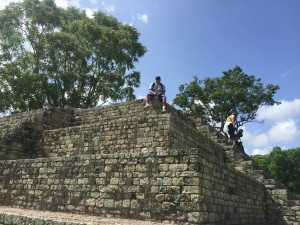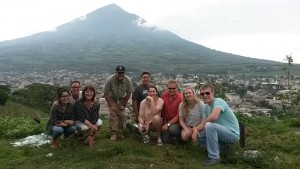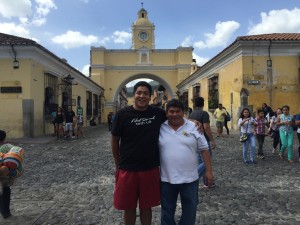When I left to Guatemala I only had a small idea what to expect. I hadn’t met any of my classmates that were going and I only met one of the three professors that were going to be down there too. I never questioned going down to Guatemala and I’m really  glad I selected this country and class. My goal was to go down there and practice my Spanish speaking abilities. I got so much more than just to practice my Spanish. I saw places that were unbelievable and I met people and locals down there that I now consider my friends. Besides that, the class itself was like nothing I’ve ever done and that made it an unforgettable experience.
glad I selected this country and class. My goal was to go down there and practice my Spanish speaking abilities. I got so much more than just to practice my Spanish. I saw places that were unbelievable and I met people and locals down there that I now consider my friends. Besides that, the class itself was like nothing I’ve ever done and that made it an unforgettable experience.
The first day I was there they handled me a map and it told me how to get around town, how to get to class, and where to find everything I needed. Everything in Antigua is very close and walk able. The word ‘map’ is a bit of an understatement, it was a piece a paper that was printed and the street names were barely legible without a magnifying glass. This map also had my address on it and a highlighted route from my home to the classroom. I got to my home first and my host father, Mario, insisted that I go see the city and from there I knew him and me were going to get along great. I only had a few hours before dinner and I was just going to walk to class and walk right back, because the highlighted route seemed the easiest to follow. I got lost and I loved it. I wouldn’t use the word lost, because you really can’t get lost in Antigua, all the roads lead to a familiar landmark. By the time I knew it, I stopped using the map and started to use buildings to get me where I was going, I used the beautiful arch to let me know where I was, I used churches, restaurants, anything to remind me where I was and by the end of the first week I’ve seen all of Antigua and it was such a magnificent city.
Class was twice a day everyday unless we left for the day for a fieldtrip. I’ve never been a class like this before. This class will be hard to forget. We would read an article or a chapter or two from a book then we would discuss it in class and there was only eight of us in the class the discussions were intense. We would talk about a certain place and by the end of the week we were out in Guatemala City or another city visiting the place we just talked about all week. Another amazing thing is that we would talk about a certain person and their role in the human rights in Guatemala and they would come in, that was wonderful and I met some people that I didn’t even know existed and heard their stories and what they fought for and the obstacles they went through, they were a great inspiration. I’m very thankful I was able to hear their story and able to meet them, which was absolutely my favorite part of the class.
 This was a first time experience for me and I will never forget it. I came home and told everyone about my trip, the class was a bit gloomy but it was a real topic that not many people, especially in the U.S., speak of and I’m glad I heard the story and can now share it with people in my life. I will never forget my host family because they were always so happy and they always wanted to talk to me and ask about my life in the U.S. It wasn’t a culture shock with my host family it was more of a culture fusion because they brought me in with excitement and open arms and were puzzled to know everything they could about me, it was the same for me with them. I would like to thank the UO Latin American Studies (LAS) Program and the Center for Latino/a and Latin American Studies (CLLAS) so much for aiding me on this study abroad class of a lifetime.
This was a first time experience for me and I will never forget it. I came home and told everyone about my trip, the class was a bit gloomy but it was a real topic that not many people, especially in the U.S., speak of and I’m glad I heard the story and can now share it with people in my life. I will never forget my host family because they were always so happy and they always wanted to talk to me and ask about my life in the U.S. It wasn’t a culture shock with my host family it was more of a culture fusion because they brought me in with excitement and open arms and were puzzled to know everything they could about me, it was the same for me with them. I would like to thank the UO Latin American Studies (LAS) Program and the Center for Latino/a and Latin American Studies (CLLAS) so much for aiding me on this study abroad class of a lifetime.
– Robert Julio, Human Rights in Guatemala